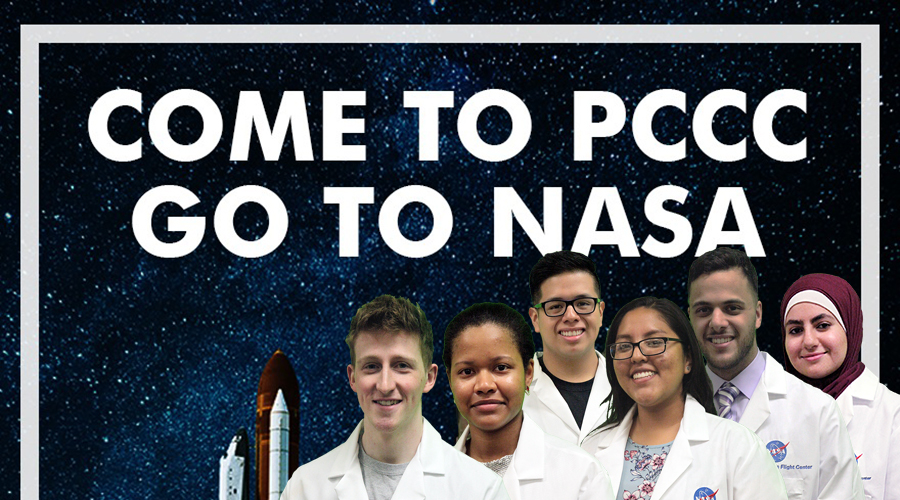PCCC Receives Over $1.1 Million Grant From NASA
Funding to Prepare Underserved Minority Students for STEM Education and Careers
PATERSON NJ – Passaic County Community College (PCCC) is the recipient of a $1,189,417 three-year grant from NASA to boost STEM curriculum and to expand educational opportunities for underserved minority students attending PCCC.
PCCC is among five colleges nationwide selected to receive the first-ever round of grants awarded through NASA’s MUREP (Minority University Research and Education Project) Curriculum Awards (MCA) Program. Other grantees include Prince George’s Community College (Maryland), University of Nevada, University of Texas Rio Grande Valley, and the University of the District of Columbia.

PCCC’s project entitled The PCCC Urban Climate Change Initiative (UCCI) will revamp the College’s Associate in Science (A.S.) Degree Program in Environmental Sustainability while forging partnerships with the NASA Langley Research Center in Hampton, Virginia and Montclair State University (MSU). Using grant funding, and in collaboration with its partners, the College will revise five courses to incorporate hands-on experiences that teach students about the impacts of climate change on their surrounding urban communities.
According to Dr. Steven Rose, President of PCCC, “Climate change is such a relevant topic in our world today, and to provide opportunities for our students to be part of the solution in addressing these issues is vital to their education and to the future of our global society. We are thankful to Congressman (Bill) Pascrell for his support and for our partnerships with NASA’s Langley Research Center and Montclair State University.”
Through the MCA program, NASA demonstrates its deep commitment to helping students from under-represented backgrounds to prepare for careers in NASA-related fields. “These awards help NASA reach students and institutions that traditionally have had fewer opportunities in cutting-edge spaceflight research,” said Shahra Lambert, NASA’s senior advisor for engagement.” As part of the grant, PCCC students will benefit from a fully equipped Climate Change laboratory on the PCCC campus and participate in summer internships on site at NASA Langley Research Center.
“Current research shows that developing new curricular pathways or adding to an existing STEM curriculum can help these colleges and universities attract more diverse groups of students to the kinds of research that align with NASA’s needs,” said Torry Johnson, the project’s manager.
Over the three-year project period, PCCC expects to build its enrollment in the A.S. Degree in Environmental Sustainability; to revamp five courses to incorporate hands-on learning activities supported by NASA subject matter experts; and to engage students in undergraduate research and internship opportunities with project partners. In particular, NASA’s Langley Research Center is home to TEMPO, the recently launched space-based satellite that has the capability of monitoring air quality at a resolution of four square miles. Using NASA data from TEMPO, PCCC faculty and students will be able to monitor air quality in urban neighborhoods, better understand the impacts of rush-hour traffic on local air quality, and to correlate air quality data with community health indicators in targeted neighborhoods and communities.
Through its partnership with NASA, PCCC students will receive paid internships that will allow them—many of whom must work due to personal circumstances—to devote more time to their studies and remain competitive with other STEM students; have access to NASA resources for elite learning tools such as atmospheric sampling equipment and sensors; meet with NASA scientists through videoconferencing; and participate in the Environmental Science Club, to be co-sponsored by PCCC and MSU, where they can experience field trips, guest speakers, and STEM competitions.
“We are excited about this opportunity from NASA to partner with PCCC on engaging students in hands-on learning and research with Montclair State University faculty,” said Dean Lora Billings, MSU College of Science and Mathematics. “This will expand our ability to prepare a diverse workforce that is ready to work on issues related to climate change and sustainability, two critical issues facing our society today.”
Associate Professor Josh Galster of MSU’s Earth and Environmental Studies Department added, “I am looking forward to working with faculty from both institutions to incorporate climate change into PCCC courses and help prepare PCCC students for future STEM careers.”
Since 2014, Passaic County Community College has enjoyed a partnership with NASA. In the past decade, over 100 STEM majors have participated in the NASA Community College Aerospace Scholars (NCAS) online program, with 62 students being offered in-person summer internships at one of the NASA research centers. In 2018, NASA provided funding for PCCC to develop the STEM Aviation Lab and to expand the engineering curriculum to include avionics. Using flight simulators, students have become familiar with aircraft flight instruments, navigation, communication, and electronics systems. Under the direction of STEM professor Dr. Ali Saleh, a group of nine PCCC students experienced an on-site, 10-week avionics internship at NASA’s Goddard Space Flight Center in Maryland.
“We invite prospective students to take advantage of the amazing opportunities at PCCC,” says Dr. Saleh. “Come and prepare for a future in environmental sustainability and climate change through hands-on training with NASA experts, an expanded curriculum, and an exciting new environmental research lab. Come to PCCC and go to NASA.”
For more information about the UCCI project or about STEM at PCCC, please contact Dr. Ali Saleh at Email:[email protected]; Phone: 973-684-5292


 Back to News
Back to News